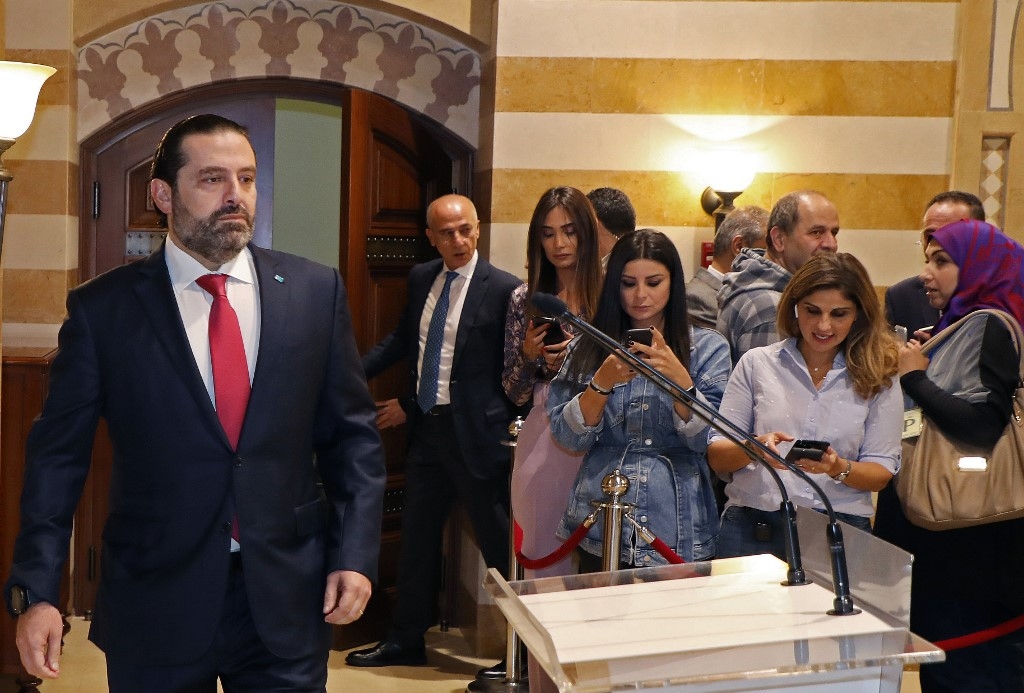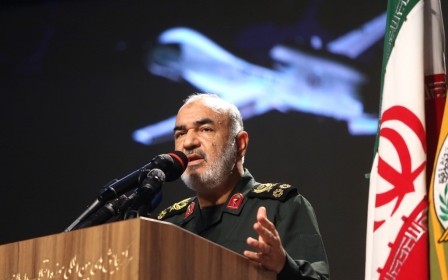Iranian press review: Hardliners say Hariri's resignation part of Saudi plot in Lebanon

Hariri’s departure divides Iranian political groups
Lebanese Prime Minister Saad Hariri’s resignation has received mixed reactions from political factions in Iran, with conservatives condemning what they said were the foreign powers that caused it.
While Iranian pro-reformist outlets suggested that Hariri resigned to accept his people’s demands, the pro-conservative dailies said that his resignation is part of a plan by Saudi Arabia and Israel to destabilise Lebanon.
On 30 October, the pro-reformist Shargh daily explained the latest developments in Beirut as a surrender by Hariri to the widespread protests in all Lebanese cities. On the same day, Etemad daily, also reformist, published the Lebanese prime minister's photo on its front page along with the headline “Hariri’s deadlock”.
Etemad also suggested that Hariri’s resignation cannot solve the economic crisis in Lebanon and only will add to the country’s political uncertainty. The daily underlined the rights of the Lebanese people to seek to change a corrupt political system, however it stated that foreign players like Saudi Arabia can use a power vacuum in the country to achieve their own goals.
Meanwhile, hardliners have echoed Iranian Supreme Leader Ayatollah Ali Khamenei’s claim that Saudi Arabia and the UAE are sending money to the organisers of the anti-government demonstrations in Lebanon and Iraq.
The pro-conservative Javan daily chose the headline “Hariri shirks” for its front page. The daily suggested that Hariri has served as Riyadh’s puppet in Lebanon, recalling that in 2017 he had offered his resignation while detained in Saudi Arabia.
Iranian political figures have also followed this line to describe Lebanon’s uprising. Hossaein Amirabdollhian, special aide to the parliament speaker, compared the power vacuum in Lebanon to the 2014 incidents in Yemen that left the country with no government.
“Back then, America and the Saudis had forced Yemen’s prime minister to resign, and now they are floundering in that quagmire,” Amirabdollahian wrote on Instagram. “Today, in Iraq and Lebanon they have started the same project of creating chaos and the fall of governments.”
Iranian movie about 'honour killings' banned again
The Iranian movie Khaneh Pedari (The Paternal House), directed by acclaimed director Kianoush Ayari, has been banned from public screening for a second time in the past nine years.
The movie is about so-called "honour killings" and domestic violence, depicting the story of three generations of the same family in Iran during the period of 1930-2000.
In 2010, Ayari obtained a permission from the culture and Islamic guidance ministry to make the movie based on his own screenplay. However, the movie was not granted a public screening after completion, due to its controversial topic.
In 2014, a year after the moderate President Hassan Rouhani came into power, Ayari’s movie finally received a screening permit. However Khaneh Pedari was screened only for two days, and was then banned after pressure from hardliners.
On 23 October, a censored version of the movie was granted public screening permission, but this screening was also short-lived and, after five days, Iran’s conservative judicial system banned the movie for a second time.
It is not the first time that one of Ayari’s movies has been prohibited from public screening. His 2005 movie, Wake up Arezoo, about the survivors of the deadly Bam Earthquake, was also banned in Iran for 13 years.
A veteran Iranian director, Ayari's movies have addressed a range of social issues, including organ donations from Muslims to Christians and water conflicts in rural parts of the country.
Over 3 million youth out of school due to poverty
During the school year ending in 2017, at least 3,297,867 Iranian children and youth were out of school due to economic issues, parents’ separation and cultural boundaries, the Arman daily reported.
Despite a law passed by the Iranian parliament in 2002 introducing penalties for parents who limit their children’s access to primary education, only 700 parents were punished for crimes related to children’s rights to education in 2016 and 2017, according to the daily.
“Poor families are dependent on the income that their children bring home,” sociologist Saeid Hojati told the paper. “In deprived suburbs, instead of school, families prefer to send their children to small workshops or to the streets to make some money in one way or another.”
The daily suggested that poverty is not the only reason that deprives Iranian children from education. Lack of sufficient number of schools in all parts of the country and the destruction of infrastructure by natural disasters are other important factors.
According to Iran’s constitution, education is free until the end of high school. However since the early 1990s, the first private schools were launched and rapidly spread in the country. Nowadays, public schools in the country have the lowest educational standards compared to private and semi-private schools.
*The Iranian press review is a digest of reports that are not independently verified as accurate by Middle East Eye.
Middle East Eye propose une couverture et une analyse indépendantes et incomparables du Moyen-Orient, de l’Afrique du Nord et d’autres régions du monde. Pour en savoir plus sur la reprise de ce contenu et les frais qui s’appliquent, veuillez remplir ce formulaire [en anglais]. Pour en savoir plus sur MEE, cliquez ici [en anglais].




